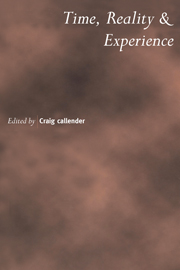Book contents
- Frontmatter
- Contents
- Preface
- Notes on Contributors
- When Time Gets Off Track
- Burbury's Last Case: The Mystery of the Entropic Arrow
- Zeno's Arrow and the Significance of the Present
- Presentism, Ontology and Temporal Experience
- A Presentist's Refutation of Mellor's McTaggart
- Time and Degrees of Existence: A Theory of ‘Degree Presentism’
- McTaggart and the Truth about Time
- On Absolute Becoming and the Myth of Passage
- Time Travel and Modern Physics
- Freedom from the Inside Out
- On Stages, Worms and Relativity
- On Becoming, Cosmic Time and Rotating Universes
- How Relativity Contradicts Presentism
- Can Physics Coherently Deny the Reality of Time?
- Rememberances, Mementos, and Time-Capsules
Zeno's Arrow and the Significance of the Present
Published online by Cambridge University Press: 05 May 2010
- Frontmatter
- Contents
- Preface
- Notes on Contributors
- When Time Gets Off Track
- Burbury's Last Case: The Mystery of the Entropic Arrow
- Zeno's Arrow and the Significance of the Present
- Presentism, Ontology and Temporal Experience
- A Presentist's Refutation of Mellor's McTaggart
- Time and Degrees of Existence: A Theory of ‘Degree Presentism’
- McTaggart and the Truth about Time
- On Absolute Becoming and the Myth of Passage
- Time Travel and Modern Physics
- Freedom from the Inside Out
- On Stages, Worms and Relativity
- On Becoming, Cosmic Time and Rotating Universes
- How Relativity Contradicts Presentism
- Can Physics Coherently Deny the Reality of Time?
- Rememberances, Mementos, and Time-Capsules
Summary
Introduction
Perhaps the real paradox of Zeno's Arrow is that, although entirely stationary, it has, against all odds, successfully traversed over two millennia of human thought to trouble successive generations of philosophers. The prospects were not good: few original Zenonian fragments survive, and our access to the paradoxes has been for the most part through unsympathetic commentaries. Moreover, like its sister paradoxes of motion, the Arrow has repeatedly been dismissed as specious and easily dissolved. Even those commentators who have taken it seriously have propounded solutions with which they profess themselves to be perfectly satisfied. So my question is: will Zeno's Arrow survive into the millennium just begun?
I certainly hope so. What I want to do in this paper is argue, not simply for its preservation, but also for its creative reconstruction. Every generation needs to reinvent the wheel. Arguments, conundrums, paradoxes have to be rediscovered and re-presented in the contemporary idiom. Philosophy of time has of course moved on since Zeno's day, but that is not to say that the Arrow cannot speak to the kinds of issues that are now engaging us.
At the end of a characteristically detailed and illuminating commentary, Jonathan Barnes offers the following observation:
It is usually supposed that Zeno's paradox carries with it some philosophical theory about the nature of time; and Zeno's commentators regularly adduce rival theories in the course of their reflexions about it. […]
- Type
- Chapter
- Information
- Time, Reality and Experience , pp. 57 - 72Publisher: Cambridge University PressPrint publication year: 2002
- 3
- Cited by

